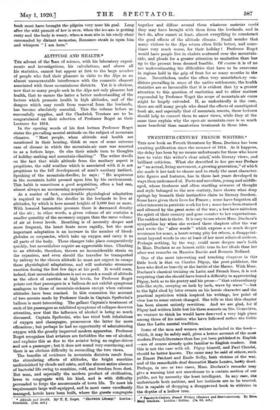TWENTIETH-CENTURY FRENCH WRITERS.* Tirtanew boek on French literature by Mine.
Duolaux has been awaiting publication since the summer of 1914. As it happens, the delay has been by no means unfortunate for those who know how to value this writer's clear mind: wide literary views, and brilliant criticism. What she described in her pre-war Preface as "an actual, living movement, a growing generation," of which she made it her task to choose and to study the most character- istic figures and features, has in these last years developed in
ways then undreamed of. Poets and novelists, young and middle- aged, whose freshness and often startling newness of thought and style belonged to the new century, have shown what deep springs lay beneath their instinctive claim to literary freedom. Some have given their lives for Prance; some have forgotten all other interests in patriotic work for her ; some have been stunned and silenced by the peat noise of the war ; a few have mistaken the spirit of their country and gone counter to her expectations. The saddest fate is theirs. It is easy to see where Mme. Duelaux's sympathies lay when she revised these chapters after the war and wrote the "after words" which express a so much deeper reverence for some, a heart-wrung pity for others, a disappoint- ment beyond words in one atleast of her most admired authors. Perhaps nothing, by the way, could more deepen one's faith In Mme. Duclaux as an honest critic true to her ideals than her after-war remarks on Maurice Banes and Romain Rolland.
One of the most interesting and touching chapters in this little book is that on Charles Peguy, the poet-publisher, the hero who died so bravely at the battle of the Marne. With Mme. Duclaux's classical training on Latin and French lines, it is not surprising that she should have found a difficulty in appreciating Peguy, both as to his poetry and his prose—" that extraordinary tide-like style, creeping on inch by Inch, wave ber wave "—but in the light shed by later events on his heroic character and the practical mysticism which inspired his writings, her point of view has to some extent changed. She tells us that this chapter has been almost entirely rewritten. And we are glad, for if Peguy had written little but his three sonnets on Ste. Genevieve, we venture to think he would have deserved a very high place among those Of his nation who have followed rather the Celtic than the Latin mental tradition.
Some of the men and women writers included in the book— which, it may be safely said, gives a better account of the most modem French literatere than has yet been published in English --are of course already quite familiar to English readers. But this is not the case with all. Peguy himself, and Paul Claudel, should be better known. The same may be said of others, such as Ernest Psichari and Emile Nolly, both victims of the war, and of the remarkable deaf dramatist Marie Lemke, lately deed. Perhaps, in one or two eases, Mme. Duelaux's remarks may give a warning hint not unwelcome to a certain section of our public, not by necessity the least intelligent. In any ease, she understands both nations, and her instincts are to be trusted. She is capable of dropping a disapproved book to oblivion in the depths of a hollow tree.
• Twastietk-Centety Prenth Writers (Reviews and Reminiscences). By lime. mare Ducianx. London : Collins. [Ts. 641. net.]


































 Previous page
Previous page